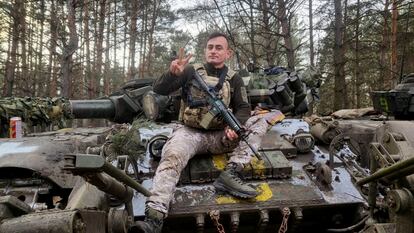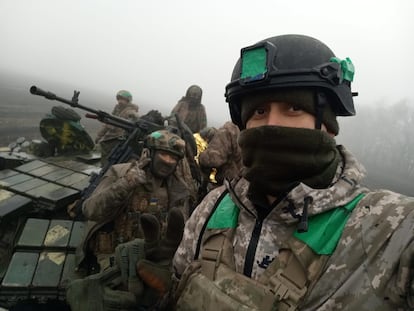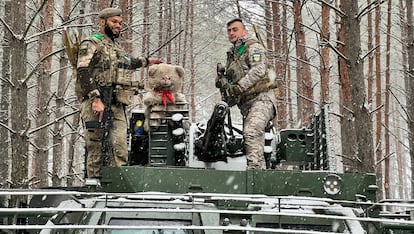Fabián’s journey of cheating death: from Spain to Ukraine and back to the Mediterranean
A member of the International Legion for the Defense of Ukraine for the past 22 months, this Colombian has participated in some of the major battles in the east. He has now retreated from the trenches, after seeing many of his fellow soldiers have die


Fabián Coy, 32, is Colombian. He has spent almost 22 months fighting to defend Ukraine.
He immigrated to Spain in 2021 because he wanted to “change society.” A soldier by profession — with experience as security contractor for transport companies — he decided to move when he was fed up with his country.
“In Spain,” he explains, in an old bunker converted into a restaurant in Kyiv, “I felt calm for the first time.” Coy — born near Villavicencio, in the Colombian state of Meta — is referring to insecurity and violence in the streets of his hometown. “The value of life changes everything,” he continues. “When you lose it, it’s hard to get it back.”
Here’s the paradox: now — after having placed himself in a warzone — he’s aware that the value of life is precious, because death was all around him. “Yes, I know,” he admits, “but what I wanted to do in Ukraine was add one plus one, do my bit… I knew I wasn’t going to save the country alone.” He responded to President Volodymyr Zelenskiy’s call for foreigners to assist Ukraine just three days after Russia invaded in February of 2022. When Coy arrived at the front, he thought he would last three months. He was wrong.
A handful of feet away from the border with the Polish town of Przemysl, one of the first booths in sight on Ukrainian territory is the one for recruiting foreigners. Since February 27, 2022 — when Zelenskiy opened his ranks to “friends of peace and democracy” who wanted to fight — foreigners from several countries have enlisted. The numbers of these brigade members are confidential for security reasons, but Kyiv has reported that men from around 55 countries have joined up, most of them Americans, British, Canadians and Poles. However, there are also fighters from Portugal, Norway, Finland, Croatia, Australia, New Zealand, Taiwan, Mexico, Brazil, Japan, Spain and Colombia. Salaries vary depending on the time and the service provided, but the figure is around 2,500 euros per month, or $2,700.
The origin of these soldiers is often revealed only after they’re killed. But sometimes, even death doesn’t mean that the information is released. Last Thursday, Moscow summoned the French ambassador for consultations, after insisting that Russian soldiers had killed several armed French citizens in Ukraine. Paris has denied this. And it’s not surprising, because even Coy himself died once (as reported by Russian military blogs). Needless to say, it wasn’t true.
The Kremlin referred to these Frenchmen as “mercenaries.” Coy distinguishes between someone who fights for money without worrying about what side they’re on, versus someone who defends a cause with his experience in combat, like him. His reason for participating, he insists, is “freedom.”
“I remember when, right after Russia attacked,” Coy continues, “my grandmother said to me, ‘You’re going to go to that war, right?’” At the time, the Colombian was still living in Madrid, working in whatever job he could find — as a deliveryman, a house painter and as a salesman at a food fair — and preparing to one day join the Spanish Army. The truth is that, since he was a child, he wanted to go to war.
In the case of Ukraine, everything happened very quickly. Coy has saved the message that he sent to the Ukrainian Embassy in Madrid on February 27, in which he informed them that he wanted to fight. “Come tomorrow,” they told him. Within days, he joined a convoy and left for Eastern Europe. “I told myself that I had come to Europe to live here,” he explains, “and I had to defend it, because after Ukraine, other [wars] would come.”

Coy has done a lot in just 32 years. He was born in a tremendously disadvantaged place. His father died from a health problem when he was only four-years-old. And, a few years later, his stepfather died at the hands of the Colombian guerrilla. Coy enlisted in the army when he came of age and fought the FARC for three years, patrolling in the jungle. He left because he didn’t believe in how operations were being conducted.
When he saved some money, he wanted to travel to fight in Iraq, but his girlfriend at the time got pregnant and had a daughter — Coy’s favorite subject. Life changed. He started working as a private security contractor, guarding trucks for the equivalent of $500 a month. This salary was enough to live on, but it wasn’t enough to keep him tied to his work. Three years ago, a cousin called him from Madrid and encouraged him to emigrate.
The website of the International Legion for the Defense of Ukraine — the official name of this body made up of foreigners — establishes four steps for enlistment: fill out a form, scan your passport, gather documents that demonstrate military experience and send everything to an address. Candidates between the ages of 18 and 60 are sought. You must be in good shape and have a solid medical history with no chronic diseases. If recruits already know how to fight, even better… although it’s not essential.
On November 30, the International Legion uploaded this message to social media: “[We] are now accepting Spanish-speaking soldiers. You can apply if you don’t speak [English] or [Ukrainian].” When asked about this, Coy admits that, in his unit — Bravo — it’s still recommended that you arrive with good English. And he has it.
La Legión Internacional y otras unidades de las Fuerzas Armadas de Ucrania ahora aceptan militares hispanoparlantes.
— International Legion for the Defense of Ukraine (@Int_Legion_UA) November 30, 2023
Desde ahora puedes aplicar hablando sólo español, no es necesario hablar inglés y/o ucraniano.
Foreign recruits continue to arrive at the front. Many of them are Spanish-speakers.
For young Latin Americans with experience in battle, it can be an opportunity to make money. Colombia — after decades of conflict with the FARC — has a populated army and several men who have extensive experience in guerrilla warfare. They also have experience combating drug-trafficking, along with American training.
Coy is alive, but he can’t say the same for many of his mates. In his interview with EL PAÍS, he jumps from one mission to another, recounting his first training in the west of the country, as well as the bombing at the Yavoriv military base, which he narrowly escaped. “No foreigners died as Russia said,” he maintains. He recalls the successful counteroffensive in Kharkiv (he recorded many videos of it) and the battle on the banks of the Seversky Donets River, in the Donbas region.
He pauses to remember his former partner, Eric. One of the company’s leaders, he was a brave fighter who seemed invincible. The operation was difficult that day. “I called my family and asked them to pray for me, because I might not come back,” Coy says quietly. “When we arrived at the disembarkation point, we heard on the radio that Eric had fallen, due to a landmine.” The explosion didn’t kill him, but a Russian guided missile did, hitting him during the evacuation.
Not everything is hand-to-hand combat on the front. There are periods of training, of preparing for an assault. There are many companies that follow each other in the same battle. And there are breaks, too. During one of them, Coy took his leave in the city of Kharkiv. One of the unit’s vehicles took him to the city and he began walking through the streets in search of a hotel. Many were closed or damaged by Russian bombings. Finally, he found one open and got a room. During those days, he became intimate with one of the receptionists, Caterina. “I saw that she was pretty and we started talking, then hanging out…” Within a year, they had married. “Maybe something has changed in Ukraine,” Coy reflects. “People live day to day.”
But he continued with his comrades in the Bravo unit, fighting every battle. That is, until last October. Losing people like Eric — or many of the Brazilian friends in his unit — made him reach a very simple conclusion: “Continuing there,” he sighs, “only guaranteed me one thing: dying.” Listening to Coy’s testimony — a valuable piece of war history — one might wonder why he wasn’t killed. Sometimes, it was pure chance. “On many occasions,” he says, trying to find an answer, “the person who — because he had more energy, or changed his position — was the one who ultimately died.”
“What do you think could be behind something like that?”
“God. I’m a very firm believer. Also, experience… and a little luck.”
Last week, Coy began the trip back to Spain with Caterina, who is a few weeks pregnant. They want to start a new life along Spain’s Mediterranean coast. He’s fine physically, although he has a problem with his hearing, as a result of the noise from the artillery. But he stays in shape. He’s also psychologically well, because he’s satisfied with what he did.
“I feel concerned for my friends at the front,” he acknowledges, in a moment of vulnerability, “but I’m more than prepared for what comes next. What I’ve seen is very heavy and I want to rest. I don’t see myself fighting anymore. I’ve already cheated death a lot.”

Sign up for our weekly newsletter to get more English-language news coverage from EL PAÍS USA Edition
Tu suscripción se está usando en otro dispositivo
¿Quieres añadir otro usuario a tu suscripción?
Si continúas leyendo en este dispositivo, no se podrá leer en el otro.
FlechaTu suscripción se está usando en otro dispositivo y solo puedes acceder a EL PAÍS desde un dispositivo a la vez.
Si quieres compartir tu cuenta, cambia tu suscripción a la modalidad Premium, así podrás añadir otro usuario. Cada uno accederá con su propia cuenta de email, lo que os permitirá personalizar vuestra experiencia en EL PAÍS.
¿Tienes una suscripción de empresa? Accede aquí para contratar más cuentas.
En el caso de no saber quién está usando tu cuenta, te recomendamos cambiar tu contraseña aquí.
Si decides continuar compartiendo tu cuenta, este mensaje se mostrará en tu dispositivo y en el de la otra persona que está usando tu cuenta de forma indefinida, afectando a tu experiencia de lectura. Puedes consultar aquí los términos y condiciones de la suscripción digital.








































